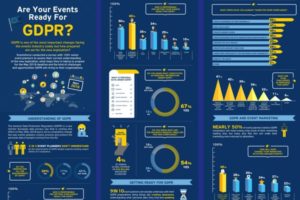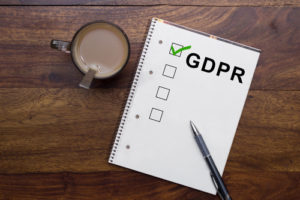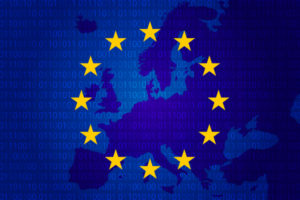
Personalisation is seen as one of the hottest trends in the events industry as attendees increasingly expect both the communication of the event and the live experience to be tailored to them in some way. At the same time, data capture tools like registration systems and apps are helping events collect valuable information on attendees to create more powerful and customised event experiences. But as good as it all sounds, is personalisation something we should all be doing? How effective is it really? And how can we get the right balance between providing value and protecting attendee privacy?
Eventsforce recently debated the topic with Carla Jones, Head of Event Operations & Client Services at Haymarket Events and Caroline Hills, Head of Digital Global Delivery at British Council at the Event Tech Live show in London. The session (available on video here) looked at what kind of tailored activities work, how effective they are in engaging attendees, as well as what impact the upcoming General Data Protection Regulation (GDPR) will have on personalisation at events.
Have a look at what they had to say:
Can you please give us a quick background on the kind of events your organisations run?
Carla Jones (Haymarket): Haymarket Media Group is one of the largest media and publishing companies in the UK – we run more than 120 events each year that gather over 20,000 attendees – from award ceremonies and gala dinners through to breakfast briefings and large-scale conferences.
Caroline Hills (British Council): The British Council is the UK’s international organisation for cultural relations and educational opportunities. With operations in over 100 countries, we host hundreds of events across the world, including the Going Global annual conference and the finals of the FameLab international science competition.
A recent study on the ROI of Event Personalisation found that 73% of event planners see data-driven marketing as a top priority for their events, with 96% using personalisation to tailor their attendees’ experiences. How important is personalisation for your organisation and how do you use it around your events?
Carla Jones (Haymarket): I think basic personalisation is a given now – we do things like using personal names in invites, confirmation emails and so on. We also ask specific questions for people who hold certain job titles and tailor content for them. We personalise event agendas – we look at why type of people have registered and use that information to create an agenda that we know would be of interest to them. When we’re bringing in speakers, we talk to them about who has registered and see if we can tailor the content of their presentations to the needs of the audience.
At Haymarket, we have a single customer view and this is very important for us. We run events as a marketing vehicle for our publishing brands – so we gather all the data we collect on an individual who engages with all our different brands and events in one place. This means at any given time, we know if someone is a valued conference customer but maybe not a subscriber to one of our publications – and we are able to personalise our activities accordingly.
Caroline Hills (British Council): The majority of events we run at the British Council globally are educational in some way, from large international conferences down to small workshops that help students prep for an exam. Personalisation in the form of multilingual event websites, registration forms and email communications (our systems currently support over 60 languages) is very important for us as it allows us to attract as many attendees as we can by offering them the ability to register in their own language.
Going Global is one of the most high-profile events we run annually – with more than eight different attendee categories each year. So we do things like personalise the registration journey for each attendee category. We use networking tools to allow attendees to set up their own meetings prior to the event. We also use an app to give attendees a more tailored experience of the event – they can see their personal agendas, arrange meetings with other attendees and receive material from sessions they’ve attended directly into their app.
What challenges do you face with personalisation and how do you address these challenges?
Carla Jones (Haymarket): Lack of time and resources is definitely an issue. I think the bigger issue, however, is that it’s difficult to see what kind of return you’re getting from doing personalisation – which is probably why the majority of event planners stick to basic personalisation. For example, we don’t see the value of apps for our events – personalised push notifications and fully integrated apps simply don’t offer value for money. I also think it’s difficult finding that balance that’s going to benefit both you as an organisation and the attendee.
Caroline Hills (British Council): We find it very difficult to measure the ROI of personalisation, even when you’re personalising down to the level of using event apps – so we use these very sparingly at a handful of conferences a year as they are expensive. We try to measure the return of some of our personalisation efforts by looking at how efficient the registration journey has been using various methods. Analytics can be very helpful to pinpoint drop off points. For Going Global, we sent one of our User Experience colleagues to the event with a big tub of chocolate which he used to incentivise attendees to answer a small number of questions about the registration journey. That helped us a lot and we made a number of changes to the journey the following year!
Registration systems are seen by 84% of events planners as the most effective data collection tool for the purpose of personalisation. In light of that, how do you decide what personalisation data you need to collect in registration forms? How do you get the balance right in a way that brings value to both attendees and the organisation hosting the event?
Carla Jones (Haymarket): I think you always have to put yourself in the place of the attendee. Remember that too much personalisation can be invasive and doesn’t necessarily bring any value to the event experience. I attended one event recently where each time I attended a seminar, my badge was scanned and consequently was sent lots of stuff that I wasn’t interested in. You really have to be careful not to take it too far. Instead of that warm fuzzy feeling that shows we care about you – you’re being bombarded with info. This isn’t personalisation – it’s boxed as personalisation but it’s not. It’s actually tailored marketing. You have to think about your end user. What is your attendee going to get out of it? What is the impact? If you don’t get balance right, you’re going to annoy them. Remember that people are happy to give you their information if they see value in doing so.
With our events, we agree beforehand what data we need to collect and for what purpose – so if we know we’re going to tailor content according to job titles, then this is something we take into consideration when deciding on questions in registration forms. I also think to get the balance right, you need to be aware what questions should be mandatory and what shouldn’t. Mandatory questions should be there only for the purpose of getting them to the event – anything else should not be mandatory. Also, if you ask lots of questions and make it all mandatory, then you’ll get a lot of people just filling in the forms with rubbish. Where is your quality of data? You don’t want data that is useless.
Caroline Hills (British Council): Yes, I think it’s really key to ask only those questions that you need the answers for to successfully register someone and get them to your event. Always ask yourself what you need to know and then figure out how to ask for that information in as few questions as possible. If you want to ask additional questions for the purpose of personalisation where the answers are nice to have but not essential, then yes, make them optional so attendees don’t have to answer them if they don’t want to.
It’s also key to think about how you’re asking for that information. Don’t ask for their data of birth, for example, if you only need to know if they are over 18. Don’t ask for passport numbers if you want to make sure they have a valid passport – ask if they have a valid passport instead. By doing this you’re reducing the amount of sensitive data you’re collecting to a minimum, which will make potential attendees more comfortable parting with their information. This also reduces your data protection risk level, which will become even more important when GDPR comes into force this year.
The issue of data protection is a big one when it comes to personalisation. What impact you do you think the EU GDPR will have on personalisation efforts around events?
Carla Jones (Haymarket): With GDPR, you won’t be able to have registration forms anymore with pages and pages asking for sensitive demographic information – there’s been a general attitude that if people are coming to an event (especially when it’s free) then take advantage and ask as much as possible. But GDPR will flip this. Event planners will need to think about things a lot more carefully. You’ll need to get the right kind of detailed consent to use this data. You will need to think about how you’re going to keep this data safe – as the more data you hold, the higher the risk of breach. So, it’s not worth collecting ‘personalisation’ data if you’re not going to end up using it. GDPR will force event planners to be a lot more careful about how much data they’re collecting from attendees and for what purpose.
Are your events ready for GDPR? Get your FREE eBook: ‘The Event Planner’s Guide to GDPR Compliance’, and learn what impact Europe’s new data protection regulation will have on event marketing, data management and event technology – as well as what steps event planners need to take now to get ready for the May 2018 deadline.
Caroline Hills (British Council): The biggest impact of GDPR on the events industry will mostly be around consent and permissions, and the biggest challenge around this for us will be educating people about the dos and don’ts so that we stay compliant with GDPR. Our small central team can’t audit every single event and say you can’t ask this and you can’t ask that, it’s not practical for organisations like ours. You also have the challenge of new people coming in all the time, so you have to have a continual programme of training running. We’ll probably end up having more basic registration forms to control this better globally and it might limit how much personalisation we actually do as our priority will be making sure we are compliant, rather than looking at how we can improve personalisation, as the consequences of not being compliant are potentially enormous fines.
Read: Ask the Experts – How BIG an impact will GDPR have on meetings and events?
Conclusion
The issue of data is a big one when it comes to personalisation. Before even starting the process, event planners need to think about what data they’re going to collect from attendees and agree across their organisation on how this data is going to be used for the purpose of personalisation. Attendees also need to understand why organisations are gathering their information and how it is going to bring value to their event experience. Getting that balance right is key for successful personalisation. In summary:
- Decide what data you’re going to collect, why you’re collecting it and agree across your organisation on how it’s going to be used before collecting it for the purpose of personalisation
- Don’t ask unnecessary questions – this will have a negative effect on the attendee experience
- Make it clear to attendees that the information they provide will bring value to their experience and that you’re looking after their data and privacy – especially with the upcoming GDPR.
- Those organisations that can personalise event experiences but show they they’re dealing with data privacy in the right way will be the ones people choose to deal with in the future.
You can watch the full video of the discussion on event personalisation between Eventsforce, The British Council and Haymarket at Event Tech Live 2017 here.
Enjoyed reading this article? Sign up to our EventTech Talk newsletter for similar insights and weekly updates on the latest technology trends, discussions and debates shaping our industry today.








